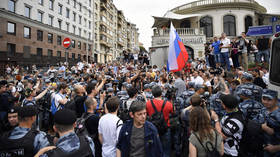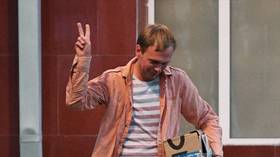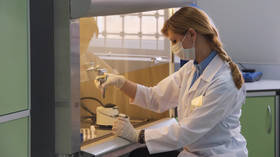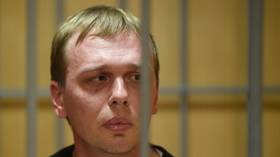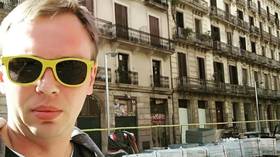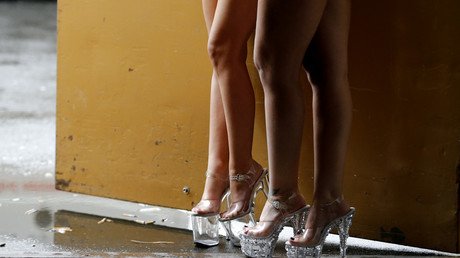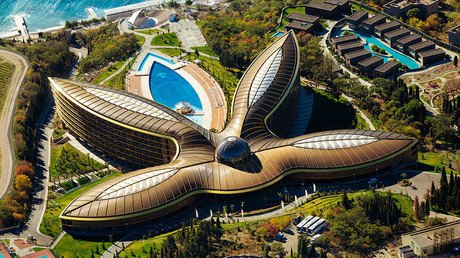‘Now I know a lot about fabricated drug arrests’: Full interview with Russian journalist Golunov
Journalist Ivan Golunov spoke to RT about his arrest on false drug charges, alleged mistreatment in custody, huge public support that he didn’t expect, and plans for the future now that he is a minor celebrity in Russia.
RT spoke to Golunov on June 12. Read the full transcript below.
RT: It’s good to see that you are finally free. So, you’ve spent the entire day at the Central Investigations Department. What did you do there? Are there any developments in the Golunov case? Many people fear that after the public uproar dies down, the whole case could be swept under the rug. What do you think about that?
Ivan Golunov: Well, the case is advancing rather quickly. Today – and today is Saturday – I spent almost the entire day at the Central Investigations Department answering their questions. So, there is a lot of activity around the case. Tomorrow I’m seeing them again.
RT: Are you going to attend the rally after all? Right now, they are probably discussing it, so…
I.G.: I will go to the Investigations Department because they still have a lot of questions; there are a lot of ‘grey areas’ in this story.
Also on rt.com Putin dismisses 2 police generals over journalist Golunov caseRT: So, it's not just the people who planted the drugs on you that they are investigating – they are also trying to find and stop the masterminds behind the whole operation, right?
I.G.: Well, basically, yes. Most of the questions were about the drug-planting itself – how it happened, who did what, and so on.
RT: You must have told your story a hundred times by now. Actually, we were supposed to meet with you before...
I.G.: And now we finally have.
RT: Yes, ten days after the original appointment. So, how did it all happen? Could you tell us all over again?
I.G.: On that day, like you said, I had been planning to meet with you. I was just a couple of blocks away from you when some young people in civilian clothes ran up to me from behind. They said they were from the Criminal Investigations Department, and that I was under arrest, and that I should already know why.
RT: ...
I.G.: They handcuffed me, took my mobile phone from my jeans pocket, and demanded that I unlock it. I refused. Then they shoved me in into a car, and only after that did they show me their IDs. A little later, they said they were from the Drug Control Service.
RT: And then they took you to the Internal Affairs Department for Moscow’s Western Administrative District?
I.G.: Yes. Actually, they arrested me in the Central District, but for some reason we went to the Western District's headquarters. They said they can work anywhere as long as it's their area of expertise.
RT: Your phone was unavailable, but then it turned on at some point. Did they try to tinker with it?
I.G.: These details should be of interest for the court and the investigation, because they did turn off the phone at first, and all I know is that it was never turned on again; at the very least they didn't have the unlock code. The phone could have been turned on after I was released, after I restored the SIM card, because they had sent the phone for forensic examination.
RT: What did they talk about? What happened during the first hours? Did they let you call a lawyer? Did they give you water or food? What was it like?
I.G.: Well, I spent the first few hours handcuffed, with my hands behind my back. When we arrived at the Western District’s Department of Internal Affairs, I said that I needed to inform my relatives and colleagues about my arrest. I also wanted to contact you because I didn't want you to waste time waiting for me. You ended up waiting for about an hour, as far as I know. I also said I needed a lawyer if there was going to be some kind of interrogation or investigation. I was told that I couldn't have any of that, because the law enforcement operation was still ongoing and that they couldn't allow any contact at that point. They said only that the investigator has the right to call the lawyer after he processes the arrest. According to them, I didn't have the right to contact my lawyer at any other time before that, because I could warn my accomplices and tell them to destroy all the evidence.
RT: Did you sign anything? What happened after that? Did they give you some papers to sign?...
I.G.: I kept telling them that they had to inform my relatives about the arrest and that I wanted a lawyer. I even told them the name of my lawyer. But they said they wouldn't allow it. No calls. I refused to sign any documents or do anything until I had access to my lawyer. The only time that I signed anything was when they took me for a medical examination, but that was a different department – the Healthcare Department. It was a place where their drivers get medical checks. There are lots of cameras there, and there seems to be enough transparency. So, I decided that there... it wouldn't be so easy for them to destroy the evidence. By the way, none of those documents that I had signed are part of the current case, not a single one. The protocols never even mention that I had been there. So, right up until the moment I was released, this episode was ignored completely. You see, whenever I was required to sign anything, I wrote on those papers that I was refused a lawyer, that they refused to inform my relatives of my whereabouts, that I believed the police were acting unlawfully, and that I demanded a different police squad be called in to establish this fact and investigate the situation.
RT: And all of those papers are missing from your case now?
I.G.: As far as I understand, they are.
RT: And all that happened on the first day of your arrest?
I.G.: I was arrested at around 2:35 pm, so yes, that’s how they handled me until the end of that day, and the entire next day. I was kept awake for 42 hours straight.
RT: When did they search the apartment?
I.G.: A few hours after they arrested me. After the arrest, they transported me to the Western District’s Department of Internal Affairs. They didn’t do a personal search until we got there. In my backpack, they found a small plastic bag containing some multi-colored round objects; they were on top of other things. After that, they took me to a facility to take my fingerprints. I refused to undergo the procedure until I could do it in my lawyer’s presence. Then they tried to intimidate me, saying well, we can just handcuff you and take the prints by force. But I protested loudly and very firmly; I kept repeating my demands to see the lawyer, to inform my relatives, and so on… So this lady who takes the prints said it wouldn’t work – that to get the prints, the fingers should be relaxed. After that they took me to the Healthcare Department, and only after that did they take me to my house where they searched my apartment.
RT: Speaking of the search, am I right in thinking that the police took your keys and entered your apartment, while keeping you in a vehicle downstairs?
I.G.: I don’t know whether this is how they did it or not. What I know is that first, we went to the Healthcare Department, and there was an incident there – when the policemen actually dragged me downstairs and I got hit a few times. After that, they took me to my house. The accompanying police officers kept calling someone and were receiving instructions from these unknown people, who said, ‘we are on our way, wait for us but clear the entrance, you’d better move further away’. So our van drove away from my house, and we changed location several times; again, allegedly on the orders of these unknown people who allegedly would say that we were parked in the wrong place, even though I have no idea how they could have seen us. And they kept on saying they were on their way and would be there soon. Half an hour later they called and said we could come. They drove to my house again, and I saw a few other police cars parked there, with policemen waiting outside. Some of them accompanied me to my apartment. They police had taken my keys during the personal search. It was interesting that the officer who unlocked the door seemed to have no trouble identifying the right key out of a couple of dozen that I have hanging all together, and opened the door at the very first try. After that he read out the instructions of the search warrant, and we all entered the apartment. I took care of my dog, and the search began.
RT: You dog was there?
I.G.: Yes, it was.
RT: And that other plastic bag that was found…
I.G.: One more plastic bag, and even scales, so they could say I was “trafficking.”
RT: Do I understand it right that your rights were violated when you refused to go through with those medical procedures?
I.G.: Yes. It all started when I refused to go anywhere and said that I would remain seated right where I was until either my lawyer arrived, or a police squad arrived to check the arrest. I understood that it sounded absurd that I was demanding a police squad be called to a police department. But, I kept insisting on it. I said I refuse to go anywhere, and that they could carry me if they liked. I don’t see anything particularly wrong with that phrase but it seemed to have irritated one of the policemen greatly, and he hit me in the face twice. I didn’t understand why. I didn’t cross any lines. After that, when we were at the Healthcare Department, with cameras installed everywhere, I tried talking to the doctor, I explained to him that no one had been informed of my arrest and that I was being refused the right to see my lawyer, and I asked that doctor to call a police squad to investigate the arrest, so that they would, for example, keep me in custody until my lawyer arrived, and then we could all look into what had happened together. The doctor didn’t pay attention to my words. The police officers attempted to drag me out. I tried to hold on to my seat and other objects, to the staircase railing. At some point, we all fell down. Then they dragged me downstairs. My watch came off during that incident; it’s possible it’s still out there, and I would appreciate having it back. They dragged me outside. One of them went to get the car, and the other stepped on my chest and stood like that until the car arrived. Then they grabbed me by my arms and legs and shoved me into the back seat.
RT: Were you scared or angry?
I.G.: Neither, I don’t think. I had an objective – to get my lawyer. I realized that they may have planted things on me and that I must be very careful and focused. So there wasn’t much room for emotions, either fear or anger. They tried to reason with me, saying I’d better co-operate, that it would be better for me. I tried to stop them, saying it was no use discussing anything about my arrest with me - because I would never agree... So we’d better not talk at all. If they wanted to talk they could talk about the weather.
Also on rt.com ‘We are Golunov’: Leading Russian papers run similar frontpage supporting charged journalistRT: Looking back at all this, is there anything you wish you’d done differently?
I.G.: I haven’t had enough time to reflect upon all this. I don’t see anything I did as wrong … and I have no concerns or regrets. There’s nothing I wish I had or hadn’t done.
RT: You’re saying the police are now investigating your arrest, and that it’s being taken seriously. Do you have perhaps a hypothesis as to who might have been behind all of this -- can you think of any names?
I.G.: None of the police staff I interacted with gave me any clues. They did make some hints, implying I must know why I had been arrested, but that’s all. I think it must have had something to do with my professional activity, because drugs are something so far from me that it is absurd. I have never used drugs, never been in possession of them, let alone tried to sell them. If I were charged with something less absurd I might have got really scared, but since it happened as it did, I just pulled myself together and kept it together. We all know that Article 228 of the Criminal Code tends to be misused, that there are cases when they plant drugs on you or on your property. In my case… well, I considered the possibility that there is a chance I might have been a random target. Later, though, the police said that they had been looking into me for a while, which rules this out. So, it probably has something to do with my professional activity – either with the published investigations or with the work in progress.
RT: So, we might suppose that they had been keeping an eye on what you were working on, and wanted to prevent the release of a certain publication, right?
I.G.: Maybe. Except that I think it makes little sense to try and do something like this after the publication, unless it’s some weird kind of revenge. Usually, things like that are done preventatively - to prevent something from happening, not to punish you after you did it. As for me, I was investigating how the funeral business functions in Moscow, looking into some connections with law enforcement agencies.
RT: That’s what you said in court?
I.G.: Yes, that’s what I said in court. I had been working on that report and had submitted the final copy to my editor two hours before I came to meet you. That’s when they arrested me.
RT: And where is this copy now?
I.G.: It’s a work-in-progress. While I was under the arrest, a team of 12 investigative journalists from four different media outlets were busy collecting more evidence, doing all the fact-checking. I am supposed to meet them soon to talk about all that in detail, because I only know what they were doing in general; I haven’t seen their work yet. The idea is that it will be a joint project by a large group of investigative journalists.
RT: An investigation about the funeral business, published across several media outlets?
I.G.: I don’t know how it will be published yet. I just hope that it will be a single report authored by a dozen investigative journalists. This way, if we are indeed on to something, it’s harder to do something to a dozen different people than to just one.
RT: Do you still feel unsafe?
I.G.: I have never been in a situation like this. I feel odd. I’ve taken some extra security measures.
RT: And before, did you ever have the feeling you were being followed, watched or tapped?
I.G.: I did notice some things. I remember once taking a long stroll with some friends, and they noticed that a man had been following us, even though we took a lot of turns and it was just weird.
RT: They noticed?
I.G.: Yes, they did. It’s sad that I didn’t. It was my biggest mistake. And even when I tried to be careful after that incident, I never noticed anyone. I never saw a tail. Well, now I know that they had been following me, so my friends were right.
RT: And that wasn’t long ago, as far as I understand?
I.G.: At the end of April. That’s when it happened. I attended a Forbes party; the magazine was celebrating 20 years in Russia, and I was invited as a former contributor. I was with two friends, Alexander Sazonov of Bloomberg and Igor Terentyev. We were taking a walk from the venue, the Soho Rooms club, to Luzhniki metro station, and it was a long and winding walk, down all these little streets and alleys in that area. And all this time, there was this one man who walked behind us and even boarded the same train. As soon as we realised something odd and started talking about him, he had disappeared.
RT: And at the time, you were already working on that investigation about..?
I.G.: Yes, I was… I started working on this topic last year, that’s when my first funeral business investigation was published. And now I was planning to publish my further findings. I had been working on it since February, quite actively. And after I finished my May report about micro lending businesses from Latvia running fraud schemes, I was basically putting the story together based on the collected data about the funeral services market.
RT: Did you expect such a reaction?
I.G.: You mean people’s reaction to my arrest?
RT: Yes.
I.G.: No. I was shocked to find out. I had no idea until the court hearing, because I was moved around in prisoner vans and interrogated in offices that never faced the streets. It was only later that I found out that so many people came to the Western District’s police headquarters, and that some businesses had volunteered to supply them with free food. The first time I saw, or rather heard, that I had support was at the court hearing. It was a bail hearing, I was behind the bars, and I could hear people shouting words of support from behind the court’s closed windows. It moved me so much. Until that moment, I didn’t know anything. At the time of my arrest, I thought that maybe I’ll make it to the top stories for a day or two and then they’ll just forget about me. But to think that I had so much support, so many people – I was truly stunned to find this out and I’m extremely grateful to everyone who came to support me.
RT: Did you consider participating in the protests on Wednesday or Sunday?
I.G.: Well, after my release, after the charges were dropped I just tried to catch up on sleep, I didn’t read anything, didn’t look up any news on the Internet, so in fact the very first time I went online again was when the protest was already underway. I logged in to the live feed on TV Rain, and I saw so many people who had turned out for the rally, Grigory Oster, a famous writer, among them, and I decided to go there and join them, but then I was told that my appearance could actually harm all these people there. The protest was illegal, and the only way they could escape arrest if approached by the police was if they claimed they were merely passing by. I was advised that if I showed up I would unavoidably become the centre of attention and people would gather around me, which would give the police formal grounds to arrest everyone. So even though I really wanted to show up and say thank you to everyone, and give people a warm hug, I had been advised to stay away. I am extremely grateful to all my supporters, to all the people who rallied or did other things to show their support. You know, I still can’t wrap my head around the fact that, for instance, I was told that some people rallied to support me in Tokyo. What do I have to do with Japan? I have no idea! I have never even visited the Kuril Islands. This is beyond my comprehension. I don’t know, maybe it happened not because of me personally but because of the overall atmosphere, because people have been getting tired of all the wrongdoings and my case was just the last straw, and probably people who took to the streets did so to protest, not so much on my behalf, but on their own behalf - to show that they won’t let this kind of injustice go unnoticed.
RT: Did you get a copy of the newspapers?
I.G.: I’ve got one so far. You know, they came out when I was under house arrest, so my brother told me the news. He said that these special issues were being planned for Monday, and I didn’t believe him. I thought that maybe they would do an extra page for a number of copies, nothing more. I can’t recall any event that would have the country’s three major newspapers print a special issue stating their consolidated position on the front page. I have been given one of them, the RBK daily. And I took care to check that it wasn’t some extra page, that it was indeed how the entire issue was printed; they even moved the Security Council Secretary Patrushev to page 2 - imagine that! I’ve never seen that kind of support.
RT: I want to ask something important for you as a journalist. Now that you’re getting so much public support, is it tempting to move on from being a reporter and become an activist?
I.G.: Well, I can’t complain about the lack of activity in my life these days. You mentioned that I was arrested 10 days ago. To be honest, that’s surprising as it still feels so recent to me. You see, I have been talking to the police every day, both before and after the release. I have never had time to stop and recoup. Of course, I’m glad they are investigating my case so actively, and I will cooperate gladly. But I’ve not had the time to stop and reflect, to process what happened so that I can decide on what’s next. Secretly I wish this had never happened at all, I wish I could be the same person I was before – someone who can ride the metro and just do his job. Yes, I sometimes say it gets to me but I do love my job nonetheless.
Also on rt.com Russian media solidarity for Golunov contrasts with loathsome US/UK press bootlicking over AssangeRT: So no more metro rides for you, people recognise you on streets?
I.G.: I know it’s a stupid reply, but yes, unfortunately they do. I mean, I had to buy a hat from a street cleaner for a few bucks, and use sun glasses so I could walk around minding my business…because it’s one thing when you go to some place where you know people are friendly, and when they all know who you are it’s sort of ok; but when you just step out for a smoke and all of a sudden people start coming up saying, “congratulations on your release, we’ve been rooting for you,” it just takes you by surprise, you know. I haven’t realised the scope of it all yet, I haven’t. It’s not that I’m an expert… I mean I have some knowledge in some areas, I know a lot about the city of Moscow, including all sorts of corrupt practices. I don’t know much about Article 228. Now I know a lot about... well, let’s call it fabricated arrests, and if I can help anyone with this, if anyone wants to know my opinion, my position on this, I will be more than happy to share all I know and all I think. If I can help anyone I will. You know, I’m not the sort of person who would come out and say, “I am Ivan Golunov and I will lead you to a brand new world” – no, that’s not me. I am a guy who wants to ride the metro and who wants things to be just fine.
RT: Thank you.
Subscribe to RT newsletter to get stories the mainstream media won’t tell you.
